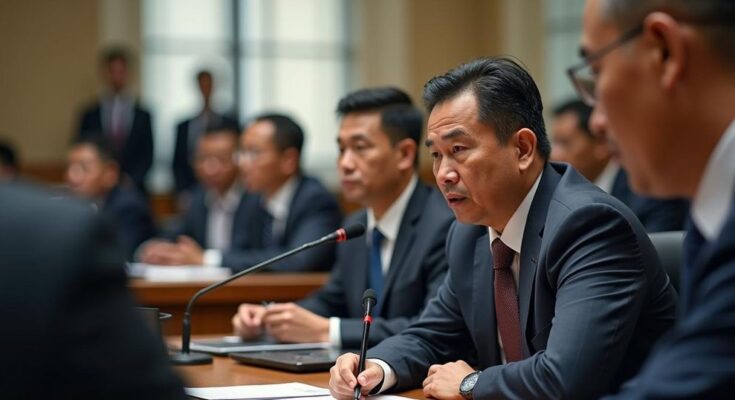Nuon Toeun’s extradition from Malaysia to Cambodia for criticizing the government exposes the increasing suppression of dissent in Southeast Asia. Advocates express outrage, highlighting concerns over human rights and the alarming cooperation among nations to stifle critics. Charles Santiago stresses the injustice of Toeun’s situation, raising fears of a broader crackdown on freedom of speech.
In a tense display of regional power dynamics, the extradition of Nuon Toeun from Malaysia to Cambodia highlights a growing intolerance for dissent in Southeast Asia. Captured in a striking photograph by Cambodian authorities, Toeun appears in handcuffs, flanked by guards, brutally illustrating the heavy hand of a regime that seeks to punish dissent from within and beyond its borders. This grim act serves as a stark warning: criticizing Prime Minister Hun Sen—or his successor, Hun Manet—may lead to severe repercussions, regardless of where one may find refuge. Toeun’s alleged crime? A social media post that questioned the regime, a simple act of expression that could land her behind bars for up to five years, compounded by hefty fines for supposedly inciting disorder. The implications of her deportation, unveiled on October 3, have ignited outrage among human rights defenders, who are alarmed by Malaysia’s complicity in silencing a critic of Cambodia’s government. “She did not criticise the Malaysian government, she only criticised her own,” asserts Charles Santiago, a former Malaysian lawmaker and co-chair of Asean Parliamentarians for Human Rights, emphasizing the injustice of her extradition. This incident is more than just a legal transgression; it is a troubling reflection of the increasingly narrow space for free speech in the region, leaving advocates scrambling to reassess and bolster human rights protections.
The political landscape in Southeast Asia has become increasingly hostile towards dissenters, particularly in countries like Cambodia, where the ruling party exerts tight control over civil liberties and political expression. Following the recent transition of power from Hun Sen to his son, Hun Manet, the regime appears poised to continue its crackdown on critics. The extradition of Nuon Toeun underscores the growing collaboration among Southeast Asian states to suppress dissent, with Malaysia, formerly considered a sanctuary for critics, now taking actions that align with the oppressive practices observed in its region. Advocates warn that this trend could stifle democratic freedoms and tighten the grip of authoritarianism across Southeast Asia.
The extradition of Nuon Toeun serves as a stark reminder of the shrinking space for dissent in Southeast Asia, illuminating the perilous consequences faced by those who dare to criticize their governments. As Cambodian authorities tighten their grip on free speech, the collaboration of regional states like Malaysia raises troubling questions about human rights protections and the future of dissent in the region. Without urgent reassessment and advocacy, the future may hold even darker days for freedom of expression across Southeast Asia.
Original Source: www.scmp.com



